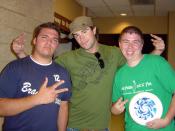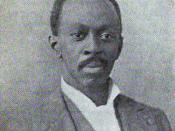Conflict As ordinary individuals who feel the necessity to succeed in every completed action in life, we tend to reject situations of failure and pain, especially when they come hand-by-hand with conflicts. As presented in "Black Boy", Richard Wright is a strong character that finds his life involved in a huge cloud of conflicts correlated with each other. During his young years of life, he might have said that those conflicts against destiny, nature, society, and/or even against himself were the worse moments of his existence. However, the infinitely effort required to overcome those situations was a crucial factor while tracing the trajectory of his life. Doubtless, he constantly suffered of hunger, fear, and injustice; but life is not fair. As a result, that unfairness enabled him to analyze the real purpose behind every experience affecting his life, making of it a fair evaluation.
Wright was born in a society full of unconsciousness and illogical regulations that would treat black people as animals or aliens.
But, how can one overcome destiny? Most of the times there are seldom opportunities that will permit an individual integrate into a discriminative society. However, as it happens to Wright, the help of someone or something, in this case the liberation of his internal courage, might serve as a great inspiration to continue fighting in the succeeding-failing process. Having to spend a childhood without toys, food, and even a father, might have obliged him to just blow away any sense of morality and maturity. But it is, instead, a factor that makes him realize about the importance of detaining one's life to learn from a situation and apply it in another.
The constant struggling against his own conscience is unquestionably on of the most influential in Wright's life. Since his earliest years of life, he was forced to make important decisions. One of them was whether or not to fight the gang who was molesting him in his way to the market. Throughout his life his mother had taught him not to fight. However, it is her who one time tells him to reveal. And after being constantly invaded with ideas arousing fear and weighting the possible outcomes of his actions, his mind dictates him to act giving him a more opened perspective of how conflicts can be solved without the overuse of violence. Whether staying or escaping from the orphan in which he was placed was another significant decision that required intensive mind struggling. He was not sure of what he really wanted. In addition, he was afraid of what traps and dark sides the world could have. Although after being discussing with his internal personality whether leaving the orphan was a good or bad idea, he left and went by the world uncertain of his future. This clearly expresses that some times self-struggling might not be the only step on deciding in favor or against an idea, but that the individual most go further and experience in order to be able to qualify the severity of the situation.
At another point of his life Wright becomes severely affected by conflict. It is this time the man vs. man-fighting which makes of his life an aberration. While walking towards a market to buy some food, he encounters a problem with a gang. They beat him, and take away the money that was destined to the food. Being younger and morally lower, he becomes afraid of them and goes right away back home. The act repeats several times, but one time his mom tells him to fight for himself. This, much more than a lesson of violence to create a criminal, serves as an inspiration for Wright to discover self-management. It serves as an example to show that one's self courage lies in the most profound part of our entrails, and that no matter which types of physical or moral weaknesses one might have, "the brave lives until the coward wants." The effect that different kinds of conflicts during our childhood might have in our personalities, and as a result in our lives might not be of much importance at a young age. "Yet in one way or another, we are all deeply affected by our childhood awakenings." They do not just help an individual mature and react with ethic when faced to real-life situations but in addition, it gives more opened perspectives of how different problems could be solved.





